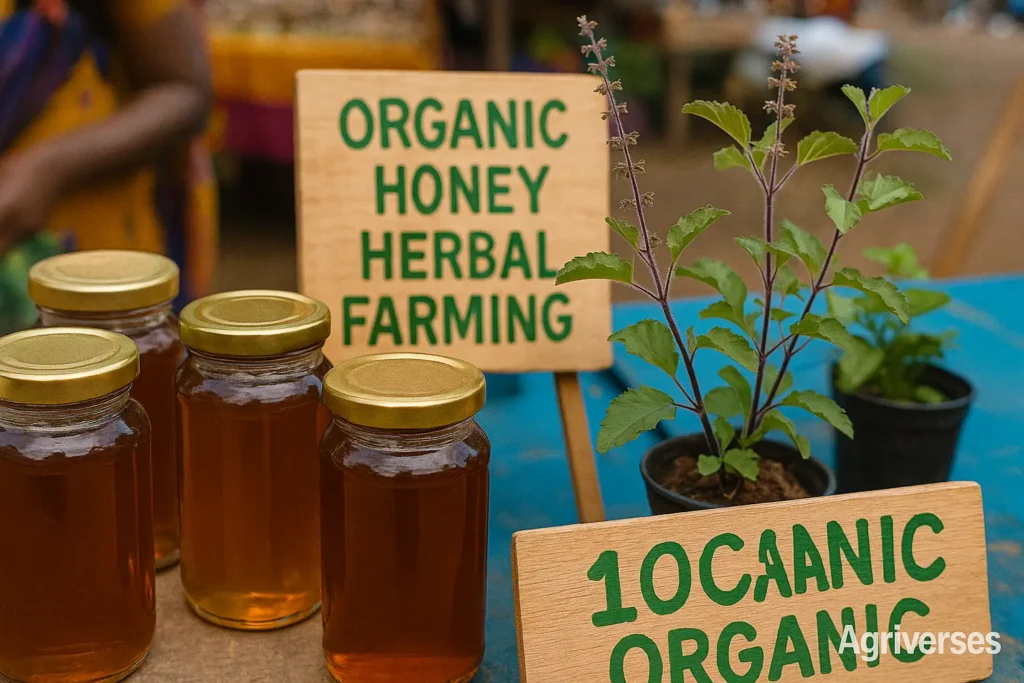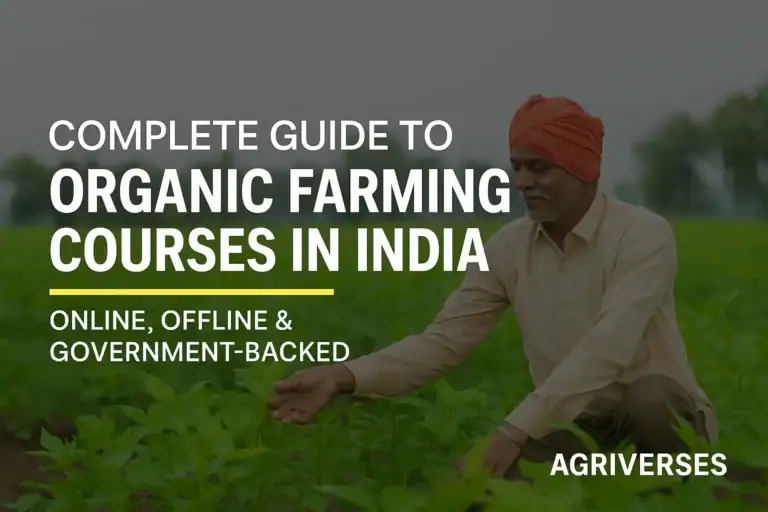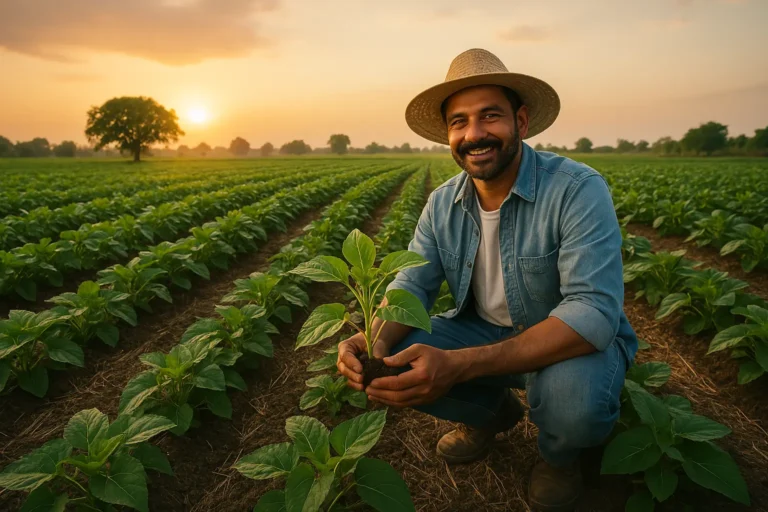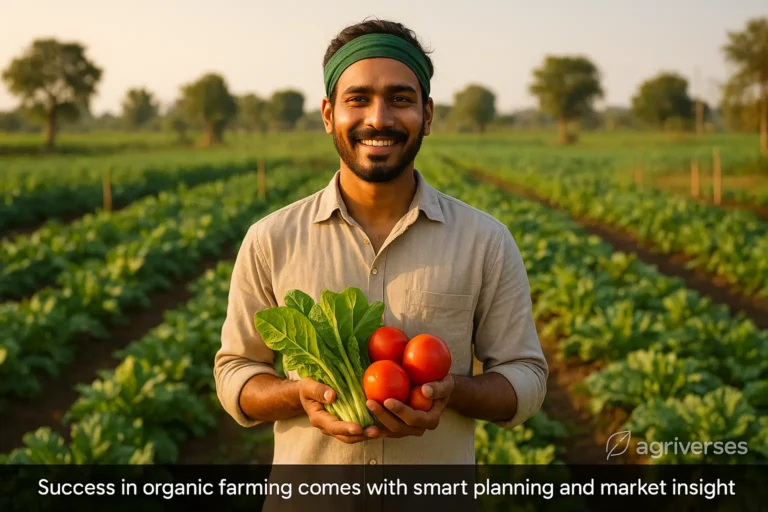Introduction: Why This Topic Matters More Than Ever

In the heartlands of India, farmers are grappling with rising input costs, unpredictable monsoons, and the burden of chemical-heavy farming. Many are asking — “Is there a better way?” Meanwhile, agri-students and rural youth are hungry for practical, impactful project ideas that are not just academic exercises, but real solutions.
This article dives deep into organic farming Project in India ideas — whether you are a student looking for a hands-on assignment or a budding entrepreneur hoping to launch a green venture. We’ll explore mini-projects, startup plans, tools, and real-life desi solutions that can make your agri-journey meaningful and market-ready.
To start any of these projects, it is important to first get the right training: Organic Farming Courses in India”
Let’s sow the seeds of change — one idea at a time.
Why Organic Farming project are Gaining Popularity
A few years back, “organic” was just a trend in city supermarkets. But today, it is a movement rooted in our gaon (villages).
Farmers are increasingly ditching pesticides and urea for jeevamrut, cow dung, compost, and desi seeds. Why? Because organic practices are proving to be more resilient, cost-effective, and soil-friendly in the long run.
For students and young innovators, this creates a goldmine of opportunities:
- Educational value: Learn real farming science, not just theories in class.
- Market readiness: Urban demand for clean food is booming.
- Sustainability: Organic methods restore soil, protect biodiversity, and reduce chemical runoff.
Many colleges now actively support rural internships and field-based learning. A well-planned organic farming project in India can even lead to awards, startup grants, or research fellowships. And in some cases? A full-blown rural business.
If you are looking for online courses for your project, this list will help: Free & Paid Organic Farming Courses Online
Mini Projects for Students (B.Sc./Diploma Level)

If you’re an agri student, you know how vital it is to pick a topic that’s field-worthy, data-driven, and practical. Here are some student-friendly project ideas that are simple yet deeply impactful.
1. Composting Models: From Khaad to Cash
Try making comparative compost pits – traditional cow dung compost vs. vermicompost vs. kitchen waste compost. Collect field data on:
- Time to decomposition
- Odor levels
- Nutrient values (basic NPK tests)
- Cost vs. output ratio
It’s low-budget, but eye-opening. Many students in Maharashtra and UP are now helping their villages install vermicompost tanks after such projects.
2. Zero Budget Natural Farming (ZBNF) Trials
Inspired by Subhash Palekar’s model, design a 20×20 ft plot using ZBNF techniques – jeevamrut spray, mulching, and mixed cropping. Compare with a control plot using fertilizers.
You will learn:
- Soil structure improvement
- Water retention differences
- Pest resistance in natural systems
Farmers around Andhra Pradesh have already adopted this model, and student-led trials can give it a wider push.
3. DIY Natural Pest Control Sprays
Use ingredients like neem, garlic, green chili, and cow urine to create bio-pesticides. Document their effect on crops like brinjal, tomato, or okra. Use control plots for comparison.
This builds understanding of botanical pesticides, plant immune response, and IPM (Integrated Pest Management) — plus, it gives you a recipe bank for local farmers.
Startup-Level Projects with Market Potential

Want to move beyond lab experiments? These ideas are perfect if you’re looking to build a real agri-business, even from your backyard or college farm.
1. Organic Honey Farming & Beekeeping
This is one of the highest ROI ventures in organic farming today. You need basic training, a couple of bee boxes, and some flowering plants nearby.
You can start small and sell to:
- Local kirana shops
- Online stores (Amazon, Etsy)
- Organic mandis and exhibitions
Students from Uttarakhand and Himachal are turning into “madhu-udhyamis” (honey entrepreneurs) after project trials!
2. Herbal Plant Farming (Tulsi, Brahmi, Aloe Vera)
Ayurvedic and wellness industries are booming. Organic medicinal plants have huge demand in Dabur, Patanjali, Baidyanath, etc.
Start with:
- Soil testing and seedling prep
- Organic pest control methods
- Packaging + sample branding
Such a project teaches both agronomy and agripreneurship – a killer combo.
3. Organic Vegetable Basket Service
Try launching a pilot in your locality – collect vegetables from nearby organic farmers, pack them nicely (with your branding), and deliver weekly to urban families.
What you’ll learn:
- Cold chain basics
- Packaging techniques
- Digital marketing (Instagram reels, WhatsApp groups)
Students in Punjab and Bangalore suburbs have already begun selling “farm to fork baskets” through WhatsApp and Google Forms.
Scientific Insight: How Organic Farming Actually Works
Here’s where theory meets reality. When you switch to organic, you’re not just avoiding chemicals. You’re building a living soil ecosystem.

What Happens in the Soil?
- Microbes like Rhizobium and Azotobacter break down organic matter, releasing nitrogen slowly — ideal for steady plant growth.
- Earthworms and fungi (like Trichoderma) aerate the soil and fight off pathogens.
- Mulching and crop rotation improve moisture retention and reduce weed pressure.
Organic soil is like a sponge full of life, not a dead medium loaded with chemicals. It adapts better to weather shifts and needs less water in the long run.
That’s why the scientific community, from ICAR to FAO, is promoting regenerative and organic models to fight climate stress and rural poverty.
How to Choose Your Project and Tools You’ll Need

With so many ideas out there, how do you pick the right one?
Ask Yourself:
- What’s locally available in your region? (eg. cow dung, neem leaves, herbal plants)
- Do I have access to a mentor or KVK expert who can guide me?
- Will this idea help a real farmer or add value to the community?
Must-Have Tools for Any Organic Project:
- Soil testing kit (available via Krishi Vigyan Kendras)
- Basic field logbook or mobile app for recording data
- pH meter and moisture meter (for compost and soil trials)
- Jute bags, organic sprayer, protective gloves
And don’t forget the most powerful tool: your curiosity.
Real-World Inspiration
Here are a couple of examples of how students and rural innovators are using these ideas in real life:
- ICAR’s Organic Farming Portal: Offers case studies and crop-specific guidelines.
- Agri Startup Incubation Program by MANAGE: Funds young entrepreneurs in organic and sustainable agriculture.
Following these models can help you get mentorship, exposure, and even funding.
Final Thoughts: Start Small, Grow Big
Whether you’re a student in B.Sc. Agriculture or a rural youth with a plot of land and big dreams — an organic farming Project in india is more than just a subject. It’s your way to solve real problems — from toxic soils to market gaps — with natural intelligence and community spirit.
If you found this article valuable, share it with your college group, local KVK team, or fellow farmers. Let’s spread these ideas like seeds in the wind.
And for more such desi-meets-science insights, do follow Agriverses — your digital kheti diary.
Can your project be profitable? Read this article: Is organic farming profitable in India?
What’s Next for Indian Farmers?
Imagine a rural India where:
- A B.Sc. student runs a successful aloe vera processing unit.
- A group of friends launch an organic veggie brand from their terrace.
- A young farmer earns extra by selling neem-based pest sprays in his block.
This future is not a dream — it’s growing silently in fields, backyards, and college projects across India.
Organic farming isn’t just about going back to old ways — it’s about moving forward with wisdom. The youth of India holds the plough and the pen. With the right ideas and intention, we can create a farming model that’s proud, profitable, and planet-friendly.
Let’s get our hands dirty, minds curious, and hearts rooted — in the soil of real change.
Article by Agriverses – Cultivating Ideas, Sowing Change.







2 Comments